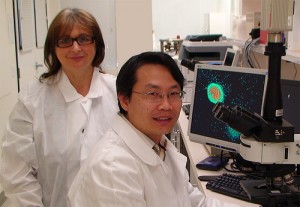Bermuda Clinic Hails Partner’s Breakthrough
 Stemedica, the international biopharmaceutical firm which has partnered with Bermuda’s Brown Darrell clinic to conduct adult stem cell treatments on the island, today [Nov.14] announced a potentially revolutionary breakthrough for spinal cord injuries.
Stemedica, the international biopharmaceutical firm which has partnered with Bermuda’s Brown Darrell clinic to conduct adult stem cell treatments on the island, today [Nov.14] announced a potentially revolutionary breakthrough for spinal cord injuries.
San Diego-headquartered Stemedica said recent treatments it conducted involving paralysed rats had led to “significant functional recovery.”
The new treatments — submitted to the US Food & Drug Administration for human clinical trials in 2012 — could have significant long-term consequences for victims of paralysis.
“Brown-Darrell Clinic salutes our partner Stemedica [two of its researchers are pictured] on this promising accomplishment and we look forward to working with them in the future,” said a spokesman for the Bermuda clinic.
Plans for the Bermuda clinic on the South Shore in Smith’s Parish, run as a partnership between local physician Dr. Ewart Brown, his wife Wanda Brown and Stemedica, were announced in 2007.
The Bermuda clinic has yet to carry out any local treatments using adult stem cells technologies but ultimately hopes to use them for spinal cord injuries as well as other conditions such as Alzheimer’s, Parkinson’s disease, diabetes and diseases of the eye.
“Transplanted neural stem cells [NSCs) developed by Stemedica Cell Technologies, Inc., a leader in adult allogeneic stem cell manufacturing, research and development were successful in treating rats with spinal cord injury,” said Stemedica this morning.
“The research conducted by Ivan Cheng, M.D., Assistant Professor in the Department of Orthopedic Surgery, Stanford University School of Medicine, was presented at the North American Spine Society Annual Meeting in Chicago, Illinois on November 2, 2011.
“Dr. Cheng’s paper was entitled ‘Functional Assessment of Acute Local Versus Distal Transplantation of Human Neural Stem Cells Following Spinal Cord Injury’. The data represent a significant finding in the field of spinal cord research.”
In the research, 24 subjects underwent a controlled injury rendering them paraplegic.
The experimental subjects then received either an injection of Stemedica’s ischemic tolerant human NSCs adjacent to the site of injury or an intrathecal injection of NSCs distal to the site of injury.
According to Dr. Cheng, “The acute transplantation of NSCs into the rat’s injured spinal cord lead to significant functional recovery. This occurred whether the cells were injected either locally or distally. This preclinical research holds promise for patients in that we may be able to inject Stemedica NSCs through a traditional lumbar puncture in the acute phase after their injury.”
Stemedica’s ischemic tolerant neural stem cells were developed by Alex Kharazi, M.D., Ph.D., Chief Technology Officer at Stemedica and were made available to leading medical institutions for preclinical research.
Dr. Kharazi noted that “Dr. Cheng’s data in rats support our internal research. We have successfully transplanted NCSs into chicken embryonic brain and demonstrated that our NSCs engraft, migrate and differentiate into a variety of neural and glial cells.”
An Investigational New Drug [IND] application for NSC use in human clinical trials is currently being prepared for submission to the US Food and Drug Administration.
Stemedica hopes for the initiation of human clinical trials in early 2012.
The NSCs are the second product to be released by the San Diego based company. Ischemic tolerant mesenchymal stem cells are currently in a Phase I/IIa clinical trial for ischemic stroke at the University of California, San Diego School of Medicine.
Nikolai Tankovich, M.D., Ph.D., Stemedica’s president and Chief Medical Officer, points to the significance of these findings, “This basic science research is encouraging for the more than 250,000 Americans who suffer from spinal cord injury, and the 11,000 who join their ranks each year.
“We look forward to the day when effective treatment for spinal cord injury can limit and help reverse the damage and suffering that these patients endure.”
Maynard Howe, Ph.D., CEO of Stemedica noted that, “We anticipate continuing our collaboration with the researchers at Stanford University to advance a clinical trial path for patients with this debilitating condition.”
Stemedica’s adult stem cell technology is based on thirty years of research and clinical experience conducted by researchers and clinicians in the United States, Europe and the former Soviet Union.
Adult stem cells are found in all tissues of the growing human being and, according to latest reports, also have the potential to transform themselves into practically all other cell types, or revert to being stem cells with greater reproductive capacity. tissue).
Stem cells are of wide interest for medicine, because they have the potential, under suitable conditions, to develop into almost all of the different types of cells.
Theoretically, they should therefore be able to repair damaged or defective tissues such as destroyed insulin-producing cells in the pancreas.
Many of the so-called degenerative diseases, for which there are as yet no effective therapies, could then be alleviated or healed by developments in adult stem cell technologies.

